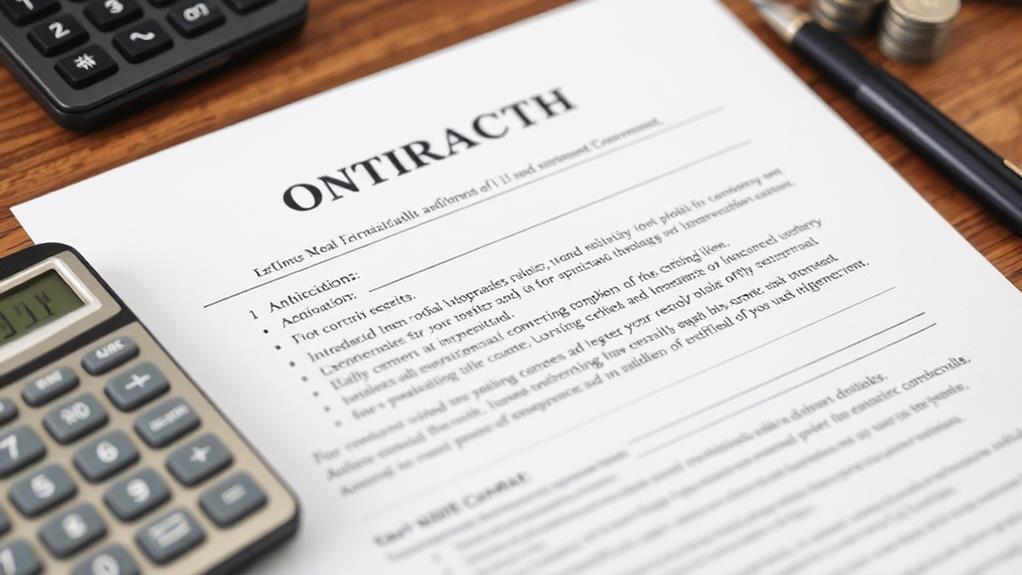When selecting trustworthy contractors, start by gathering reliable recommendations from friends, family, or online reviews. Conduct thorough interviews to gauge their experience and ask for references. Verify their credentials by checking licenses and insurance coverage to ascertain they comply with regulations. Review detailed estimates from multiple contractors to compare pricing and project specifications. Finally, establish clear contracts that outline the work, materials, and payments linked to milestones. Following these tips can help you choose a contractor who meets your needs, guaranteeing a smoother project experience. There's more to learn about how to ensure your choices are well-informed.
Gather Reliable Recommendations

When searching for trustworthy contractors, gathering reliable recommendations is essential. Start by asking friends and family who've completed similar projects. Their firsthand experiences can give you valuable insights into a contractor's reliability and quality work.
Additionally, consider checking online review platforms for contractor ratings, as these can provide further context on their performance. Don't forget to consult with neighbors who've undertaken comparable renovations; they can share their experiences as well, including any challenges they faced.
Additionally, consider reaching out to professional associations like the National Association of the Remodeling Industry (NARI) or the National Association of Home Builders (NAHB). These organizations can provide lists of qualified contractors in your area.
Speaking with local building inspectors can also be beneficial, as they often have experience with various professionals and can suggest reputable contractors.
Conduct Thorough Interviews
Conducting thorough interviews is vital to finding the right contractor for your project. Start by asking if the contractor has experience handling projects of your size; this guarantees they're suitable for your needs.
During phone interviews, gauge their expertise and willingness to take on your work. It's also wise to request financial references from suppliers or banks to evaluate the contractor's financial stability and reliability.
Ask for a list of previous clients to verify the contractor's credibility and learn about their recent work quality and professionalism. This feedback can be invaluable.
Additionally, examine how many concurrent projects the contractor manages; this helps you understand their capacity and availability for your project.
Face-to-face meetings are essential for evaluating a contractor's communication skills, professionalism, and responsiveness to your ideas and concerns.
When hiring a contractor, thorough research and interviews can greatly increase your chances of finding a reliable contractor. Remember, the right contractor won't only meet your project requirements but will also inspire confidence through their proven track record and professional demeanor.
Verify Credentials and Insurance

Before you commit to a contractor, verifying their credentials and insurance is essential to protecting your interests. You want to guarantee that the person you hire is qualified and reliable. Here are some key steps to follow:
- Check their contractor licensing with local authorities to confirm they're legally allowed to do the job.
- Confirm insurance coverage, including liability and workers' compensation, to shield yourself from potential personal liability during the project.
- Request certificates of insurance directly from the contractor's provider to guarantee their coverage is current and sufficient.
Additionally, review any disciplinary actions or complaints against the contractor through state regulatory boards or online platforms. This can give you insight into their reliability and professionalism.
Assess their experience by checking certifications, as these show they meet industry standards and have the skills necessary for your specific project.
Review Detailed Estimates
After verifying a contractor's credentials and insurance, the next step is to review detailed estimates. Request estimates from multiple contractors to guarantee consistency in pricing and scope. This makes it easier to compare their services fairly. Each estimate should include a thorough breakdown of labor, materials, and any additional fees to help you avoid hidden costs later on.
Pay attention to project timelines. Look for estimates specifying start and completion dates, as this shows the contractor's reliability and planning capabilities. It's crucial to verify that the estimates reflect the same project specifications and materials. This allows for an accurate side-by-side comparison.
Be cautious of considerably lower estimates. They may signal a lack of quality in materials or workmanship, or they might overlook important project details. A trustworthy contractor should prioritize your project's success, guaranteeing there's no risk of property damage or issues with workers' compensation.
Using a contractor checklist can help you stay organized during this process. By reviewing detailed estimates carefully, you'll increase your chances of selecting a contractor who delivers quality work without surprise costs.
Establish Clear Contracts and Payments

Establishing clear contracts and payment arrangements is vital for guaranteeing a smooth construction process. When you engage a general contractor for your home improvement projects, having a signed contract helps protect both parties.
Make certain your contract includes:
- A detailed description of the work, materials, and timelines.
- A structured payment schedule linked to project milestones.
- Clauses for change orders and unexpected costs.
It's important to establish a payment schedule that minimizes financial risk. Typically, you might make payments of 10% at signing, 25% at intervals, and 15% upon completion. This structured approach encourages a good contractor to maintain attention to detail throughout the project.
Don't forget to require lien releases at each payment milestone. This step safeguards you against claims if subcontractors or suppliers aren't paid.
Additionally, always thoroughly research and retain copies of the signed contract to guarantee accountability. Clear communication about payment terms and potential change orders helps prevent misunderstandings and disputes.
Conclusion
Choosing the right contractor can feel like steering through a maze, but with these tips, you can find your way. By gathering recommendations, conducting interviews, and verifying credentials, you'll build a solid foundation of trust. Reviewing estimates and establishing clear contracts will keep your project on track, like a well-tuned clock. Remember, taking the time to select trustworthy contractors not only protects your investment but also guarantees your dream project becomes a reality. Happy building!


Leave a Reply